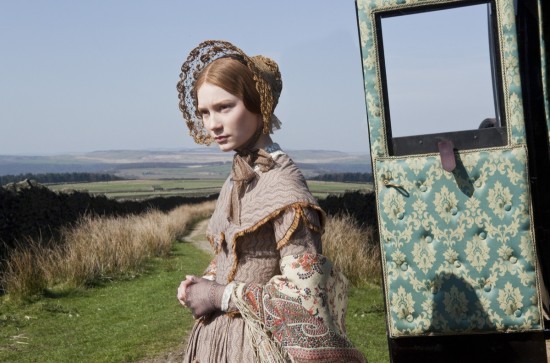
Among the plethora of film adaptations based on Victorian novels, two stories have been particularly favored. Pride and Prejudice and Jane Eyre – both of which have, in many ways, been worked to death. Yet there is a reason that directors keep returning to these stories, for if mined properly, they can prove to be a source of emotional gold. Director Cary Fukunaga (whose adeptness at revealing raw emotion has been previously proven with her film Sin Nombre) handles this latest adaptation of Jane Eyre with a subtlety that makes the re-visitation worthwhile.
Jane Erye (Mia Waskikowska), an orphan shunted into a brutal reform school and raised without affection, has every right to be skeptical of the confessions of love made to her by the landed and wealthy Rochester (Michael Fassbender), by whom she finds herself employed as a governess. Waskikowska’s Jane manages to capture this wounded sense of suspicion: she is fully fleshed, psychologically complex, and equal parts exasperating and endearing – as she is in the book.
This latest portrayal of Jane draws us in with her strength and bluntness, and wins us over with her timidity and fragility. The only complaint that might be leveled against Wasikowska is that she is by no means plain – her transparent complexion and emotive eyes are, indeed, quite transfixing. Fassbender, while slightly less engaging than Waskikowska (and far more handsome than the character Rochester has the right to be), is nonetheless believable as the moody yet tender Rochester; the chemistry between them is real enough to distract from any shortcomings.
A rich sensuality pervades every frame- palpable enough that every gust of wind, every brush of starchy fabric can almost be felt. There is a great attention to detail here, both in the way the shots are conveyed and in what they contain. It is obvious that painstaking care has been taken to remain accurate in respect to costuming, scenery and props, a level of care which manages to capture for us an era of both great beauty and great discomfort.
There are many of the same cinematic sweeps of landscape that characterized Joe Wright’s 2005 version of Pride & Prejudice, a comparison further warranted by the fact that Jane Eyre is similarly (and just as beautifully) scored by Dario Marianelli. There is, however, something deliciously darker about Jane Eyre – and while it may not live up entirely to its gothic elements, it is sufficiently eerie.
There is also something tender and wide-eyed about this film that makes its timeless romanticism seem surprisingly fresh and relevant for its translation into an era in which caution and repression have been thrown to the winds. While the repression that defines Jane and Rochester’s relationship may be somewhat unbearable to modern audiences, the slow smoldering chemistry captured in this film may serve to remind us of the benefits of holding out for the real thing.
